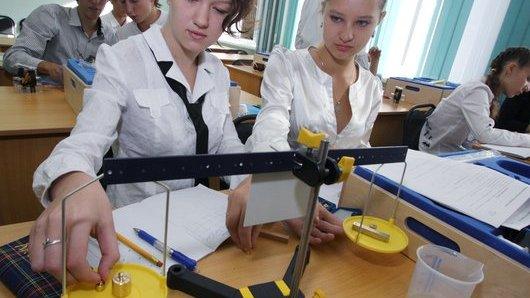Why engineering should be a woman's game
- Published

Schools can play an important part in encouraging an interest in science
I was lucky. My father was an engineer - a major in the Royal Engineers.
My parents encouraged my curiosity about the world around me and understood why I couldn't resist dismantling things from an early age.
They gave me a chemistry set one year, a magnetism kit the next.
I have always been interested in how things work.
Like many people I was inspired by a great teacher - in my case a super science teacher when I was 10.
He used to bring everyday gadgets to our lessons and explain the physics of how they worked.
I went on to study maths and then moved into engineering to work on noise reduction - my PhD project was on reducing the noise levels of Concorde.
I have enjoyed a wonderful career in engineering, at the University of Cambridge, working with some of the brightest people in the country on projects ranging from silent aircraft to low-emission power plants.
Young children are, as I was, natural engineers, constantly seeking to understand the properties of materials as they engage with the world around them.
When the cardboard structure they have built is strong enough to support the weight of other toys and becomes a medieval castle, there is the thrill of persistent and successful improvement.
Skills shortage
We must find ways to encourage experimentation in an age where our education system has a tendency to expect young people to move away from practical learning as they grow up and to become more theoretical and abstract.
Why does this matter?
Because we have a major skills shortage - by 2022 the UK will need at least 1.82 million new engineering, science and technology professionals.
We need to inspire many more young people to take up careers in these crucial areas, which will pave the way for our future economic development.
Engineering and science are evolving all the time.
Many of the jobs we will need in 20 years' time have not been invented yet, just as many of the jobs advertised today did not exist 20 years ago.
The spread of mobile technology, the development of composite materials, the sequencing of the genome, the increasing demand for energy, and many other advances have created a huge variety of fascinating new jobs.
However, there are too many people who think a career in these areas, particularly in engineering, is "not for them".
Perhaps they don't know any engineers who they can ask about the field or they have set ideas about what they want to achieve and think engineering is not a job that will provide it.
Unhelpful stereotypes
Girls in particular do not seem to think that engineering is a suitable career for them, despite their achievements in maths and science at school.
It is very frustrating to be facing a shortage of engineering skills when so few women enter the profession.

Media stereotypes tend to feature men as engineers
Only 7% of engineering professionals in the UK are female, and the proportion is even lower for engineering apprentices.
This is why the Royal Academy of Engineering has set up its Diversity Leadership Group to remove barriers and encourage more women and other under-represented groups into engineering - the Royal Society is providing a similar leadership role for the science community.
The media also has an important role to play in breaking down stereotypes in the portrayal of engineers - we know this is a cultural and sociological issue in the UK, rather than a physiological problem, as there are much higher proportions of women practising as engineers in other countries.

Proportion of women in engineering:
Engineering graduates:
1984: 7%
2003/04: 13.7%
2012/13: 14.2%
Engineering apprenticeships:
2011/12: 3%
Engineering employment (professionally registered):
2003: 2.26%
2013: 4.36%
Fellows of the Royal Academy of Engineering:
2006: 2%
2014: 4%
Source: Royal Academy of Engineering

Too few girls take physics A-level - a major gateway to engineering.
Physics is more popular with girls in girls-only schools, perhaps because they don't feel inhibited in taking physics.
The statistics in mixed state schools are quite shocking - as many as half of them are not returning a single girl for A-level physics.
Many schools are already well aware of the opportunities available and are actively encouraging and enabling their pupils to consider working in the sciences and in engineering.
The Queen Elizabeth Prize for Engineering, external, of which I am a trustee, recently held an inspiring day with the Association of Girls' State Schools for 120 Year 11 girls to meet engineers from different companies and see first hand what they are working on.
Varied roles
It is not just about A-levels and university pathways - technician-level skills are in equally high demand and yet can seem less aspirational to students.
We need to tackle this culture and the Royal Academy of Engineering has led the way with initiatives such as the London Engineering Project, external, enabling students in some of London's most deprived schools to study the demanding new engineering diploma courses.

Few girls opt to study physics at A-level
Working with businesses, not-for-profit organisations and charities, the Tomorrow's Engineers, external programme runs industry visits, workshops, Science, Technology, Engineering and Maths (Stem) Ambassador partnerships and careers resources, to help schools to incorporate engineering into their current curriculum.
The annual Big Bang Fair, external has also started to open young minds to the opportunities in engineering and science - more than 75,000 young people are expected to visit the next one, in March 2015 at the NEC in Birmingham.
Big Bang Fair gives young people a special insight into the people and processes behind today's amazing technologies.
Huge opportunities
Without this understanding, they will not think "that could be me" when they see an engineer or scientist in person or on television.
They will not pursue academic subjects that open the door to these careers, and they will miss out on the unique opportunities they can offer.
They will also miss out on a lucrative career - engineering graduates are the third highest earners over their lifetimes of all subjects studied at university.
Engineer Your Future, external, an exhibition that opened in December at the Science Museum, also aims to let young people in on the exciting world of modern engineering.
Utilising the latest research, such as the Royal Academy of Engineering and Centre for Real World Learning's work on thinking like an engineer, the museum has worked with engineering companies across the UK to create an experience that will really challenge young people to think about their future.
The exhibition is part of the government's Your Life campaign, which aims to increase the number of young people studying maths and physics and considering Stem careers.
By giving visitors the chance to try "thinking like an engineer" through interactive games and exhibits, Engineer Your Future will make it easy for young people to see how their interests and strengths could play into an engineering career.
Whether it's designing a planetary vehicle, or testing tsunami defences, whether it's developing prosthetic limbs, or making electricity available around the world, young people should have big dreams, and this exhibition will show them how they can be achieved.
The Queen Elizabeth Prize for Engineering is presented on 3 February at 1100 GMT. Details here, external.
- Published3 October 2012
